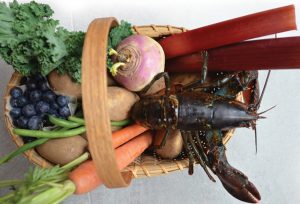Maine Farm-to-Institution: From challenges to solutions
New project seeks to make local food more sustainable
 One of the most important questions facing the local food movement in Maine is how to make it sustainable—environmentally, economically, and socially.
One of the most important questions facing the local food movement in Maine is how to make it sustainable—environmentally, economically, and socially.
A major approach has been to promote farm-to-institution (F2I) networks whereby farms will be able to sell their produce to local institutions such as universities and hospitals, while reducing environmental costs through local supply chains.
What might appear simple and straightforward has turned out to be filled with challenges: timing, need, size, and coordination. Institutions often find it easier to purchase from non-local sources despite potential economic and environmental benefits for local communities.
The F2I community partners involved in a new Mitchell Center project have focused on the fragmented nature of information as a barrier to solving these problems. Glenn Taylor, director of UMaine Dining recently won acclaim for his dedication to purchasing Maine food, and understands the challenges well.
In this novel project, students and faculty from the Honors College’s Sustainable Food Systems Research Collaborative are collaborating with Taylor and many others to overcome these barriers and enhance the success of F2I efforts.
The “Maine’s Changing Foodscape” session at the Maine Sustainability & Water Conference, which included project team members, illustrates the importance of supporting, building, and expanding research-community networks and partnerships. Presenter Ken Morse, and Maine Farm to Institution project partner Renee Page identified ways that solutions-oriented research can provide farmers and institutions with the tools they need to work together more effectively.
The Maine Farm-to-Institution Food Project is using “systems thinking” to examine the diverse and interconnected challenges faced by the F2I movement, with a particular focus on the information gaps that hamper efforts to align the supply and demand for local food. By working with key stakeholders to develop improved decision-support tools, this project can help create sustainable food systems.
